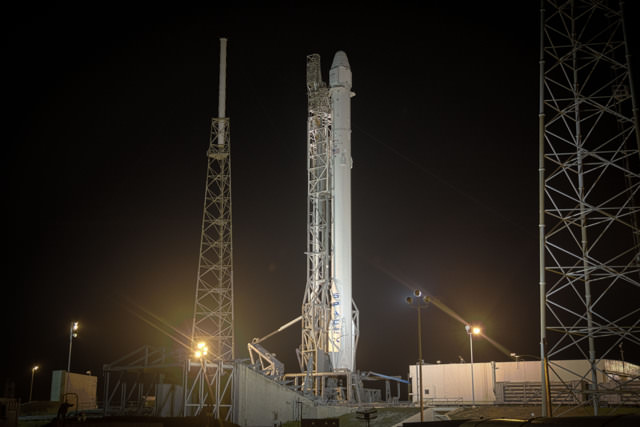An actuator that was "behaving strangely" on the SpaceX Falcon 9's upper stage caused a last minute scrub for Tuesday's attempt to launch a Dragon capsule to the International Space Station, as well as the first try at an historic first stage landing on a floating platform in the Atlantic Ocean.
Need to investigate the upper stage Z actuator. Was behaving strangely. Next launch attempt on Friday at 5am. — Elon Musk (@elonmusk)
SpaceX will try again on Friday, January 9, 2014 at 5:09 a.m. EST. Like today's attempt, there will be only an instantaneous launch window available, meaning that the blastoff must proceed at that exact instant. Any delays due to technical issues or weather would force further delays.
This is the commercial space company's fifth resupply mission to the ISS and the unmanned cargo freighter is loaded with more than 5,108 pounds (2317 kg) of scientific experiments, technology demonstrations, crew supplies, spare parts, food, water, clothing and assorted research gear for the space station.
The "experiment" that has attracted the most attention, however, is the attempt to land the first stage of the two-stage rocket on a floating platform in the Atlantic Ocean, approximately 320 km (200 miles) off the coast of Florida.
This is the first attempt at
such a landing
. SpaceX has conducted numerous successful soft landing tests on land, and done several touchdowns on the ocean's surface.
Elon Musk has estimated the odds of success at the landing attempt at about 50% at best.
"It's an experiment," said Hans Koenigsmann, VP of Mission Assurance at SpaceX, speaking at a media briefing on Jan. 5 at the Kennedy Space Center. "There's a certain likelihood that this will not work out right, that something will go wrong." He also added that the landing on the off shore barge is just a secondary objective of SpaceX, not NASA.
Many analysts say a successful landing maneuver would mark a significant step toward making rockets more reusable, which would help cut costs. But others caution that even if this first attempt is successful,
we shouldn't expect to see regular airline-like reuse and large cost drops anytime soon.
 Universe Today
Universe Today
